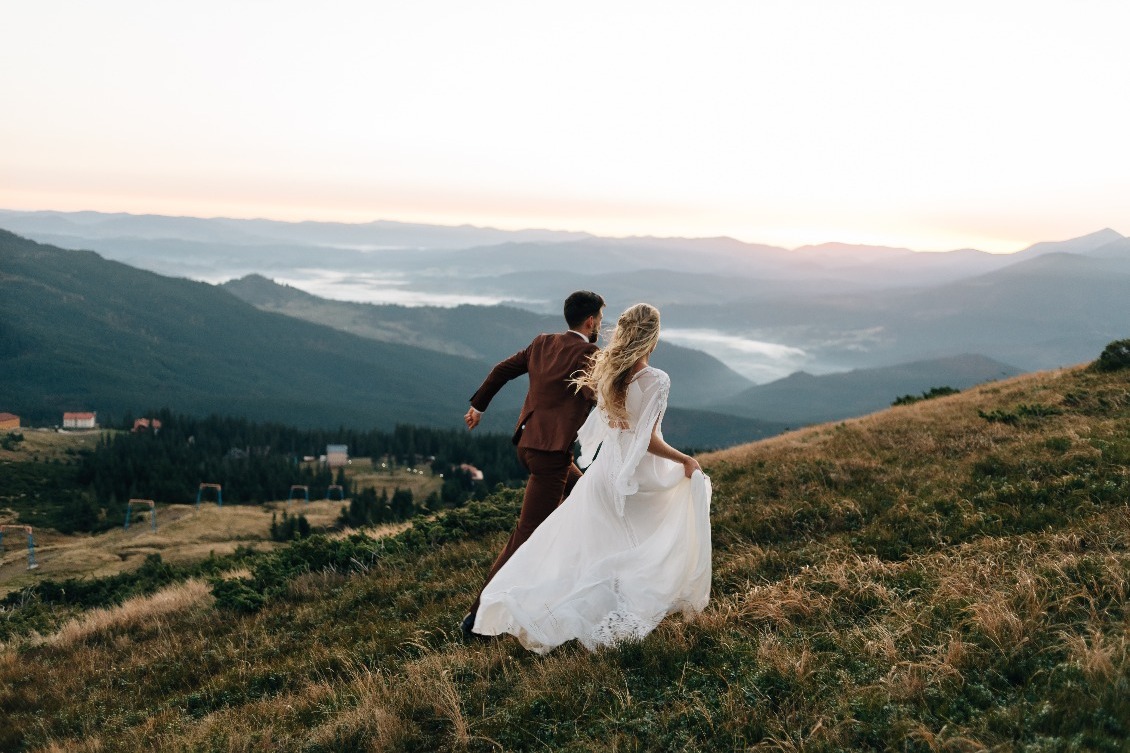Elopements are the smallest type of wedding. Traditionally, an elopement was just the couple getting married in secret, but in the modern day the definition has evolved, dropping the secrecy yet keeping the intimacy.
They're a great option if you want to skip the extra fuss of a larger wedding and focus entirely on the love between you and your partner.
The only people needed for an elopement are the couple to be wed, two witnesses, and a celebrant or minister.
If you want to keep the numbers extra low, you can either forgo vendors such as a photographer and videographer and have just two friends or family members attend as your witnesses, or you can instead ask your photographer and videographer to double as your witnesses. It's not uncommon for vendors who specialise in elopements and micro weddings to offer this service as an add-on for a small extra fee to their usual packages.
If you need some help deciding whether or not you'd like to hire a photographer and/or a videographer for your wedding, you can check out our article that goes into more detail about what they bring to your day here.
Traditionally, elopements were sudden and secretive, and often undertaken to escape parental disapproval. In modern Australia, while elopements are undoubtedly more private than other types of weddings, they no longer need to be kept completely secret.
And while familial disapproval can still be a contributing factor as to why some couples choose to elope, a lot of their current popularity comes instead from shifting priorities, with people wanting to spend less on their weddings in order to save for honeymoons or buying a home, not having as much free time to plan a large scale event, and putting less stock in a lot of the more traditional aspects of larger weddings.
With most Australian couples taking roughly 12 to 18 months to plan their weddings, eloping can also be a more spontaneous option, but it's not a way to get married immediately. You must submit your Notice of Intended Marriage (NOIM) to your celebrant at least 1 month prior to your wedding date, so in order to have a legally binding wedding in Australia, you'll still have a minimum timeframe of at least 1 month between getting engaged/deciding to get married and your actual wedding day.
And of course you've got to find a date that also works for your celebrant, witnesses and desired venue, so it's likely that the timeframe will still be a few months, at least.
Although running away is no longer a required part of eloping, elopements are still often held in scenic locations. Sometimes these are spots that hold a lot of meaning for the couple, and sometimes they're spots that require travel or would be difficult or impossible to coordinate an event at with a larger group, but are perfect for these more intimate ceremonies.
Alternatively, a lot of elopements are held at State Marriage Registries. The possibilities for ceremonies and the particulars for these will vary state by state, so make sure to check your local registries office website, but often they'll offer a 'legal only' package that is a fuss free, cheaper option.
In Victoria, for example, you can have a 15 minute long, legal only wedding ceremony with a provided celebrant, the couple, two witnesses and a professional photographer (and an interpreter, if required).
This can be a fantastic option if you want to avoid the fanfare and complexities of a larger wedding all together, or if you'd rather keep the legal parts private, or separate, from a larger celebration you want to hold at a later date.
intimacy
Having such a small party size allows plenty of time for you to connect as a couple and to experience every part of the day together, without the potential of getting pulled away to talk to guests separately.
Eloping means that you get to focus solely on each other, your vows, and the meaning of your ceremony and wedding without being distracted by other people's expectations. It can help you focus on the most important part of any wedding day - the fact that it's the start of a beautiful marriage.
lower cost
Due to their smaller size, elopements are generally much cheaper than traditional weddings with large guest lists. You can avoid having to pay for a spacious venue, catering and drinks for so many guests, bridal party attire and gifts, elaborate decor and reception entertainment.
Stripping back your celebration to the basics, or to the core things that are most important to you as a couple, can allow you to save money on your wedding that can instead be allocated to your honeymoon, buying a home, or other experiences that you'd prefer to splash out on.
less stress
The smaller size of elopements also requires a lot less coordinating between different people - from vendors to extended family to your bridal party. Keeping it super small can make eloping a much less stressful option, and can stop you from getting too overwhelmed with all of the details and logistics required for larger weddings.
It also means that the timeframe for planning is generally much shorter than what's required for bigger events.
freedom & flexibility
Eloping allows you to be more spontaneous and flexible than a traditional wedding, and gives you the freedom to make decisions without worrying about pleasing a large group of people. You can choose a date, time, and location that suits you without stressing about whether it'll also suit dozens of other people.
You can skip the extra fuss of traditions that don't hold personal meaning for you, avoid societal and familial/cultural expectations, and focus on having a wedding day that's exactly as you want it to be. You can even elope now and hold a bigger party later, if you'd like to - it's up to you!
potential hurt feelings
It's natural to want to be included in the big life moments of people that we love, and your families and close friends may be expecting to be part of your wedding day. Hearing that you've decided to elope may make them feel hurt or excluded, which can lead to tension in your relationships.
Depending on your personal circumstances, you may be able to mitigate this somewhat if you explain the reasoning behind your decision to elope before you get married, and try to find other ways to include your loved ones in the wedding planning, or in other celebrations.
limited celebrations
Eloping means that you’re skipping the big traditional wedding celebration, which might be slightly disappointing when society has an expectation of weddings being a huge party. And even if you're deadset on wanting to elope and don't enjoy being in the limelight, there may still be a sense that you're missing out on the joy that comes from celebrating a milestone event with a group of loved ones.
You can always choose to have a reception or party later on, though - either close to your legal wedding date, or maybe to celebrate an anniversary - so you don't have to miss out entirely.
Eloping is a perfect choice for couples who value simplicity, intimacy, and cost-saving over a traditional wedding day with a full ceremony and reception.
It might be challenging to go against the expectations of family and friends who imagined you having a larger wedding, but if you and your partner are on the same page and have the same priorities (which hopefully you do, considering you're getting married!) an elopement can be a truly fantastic option for your wedding.
If the relative ease of eloping is appealing to you, but you can't narrow your guest list down to just two witnesses, you might be interested in having a micro wedding, which is the next article in this series.







